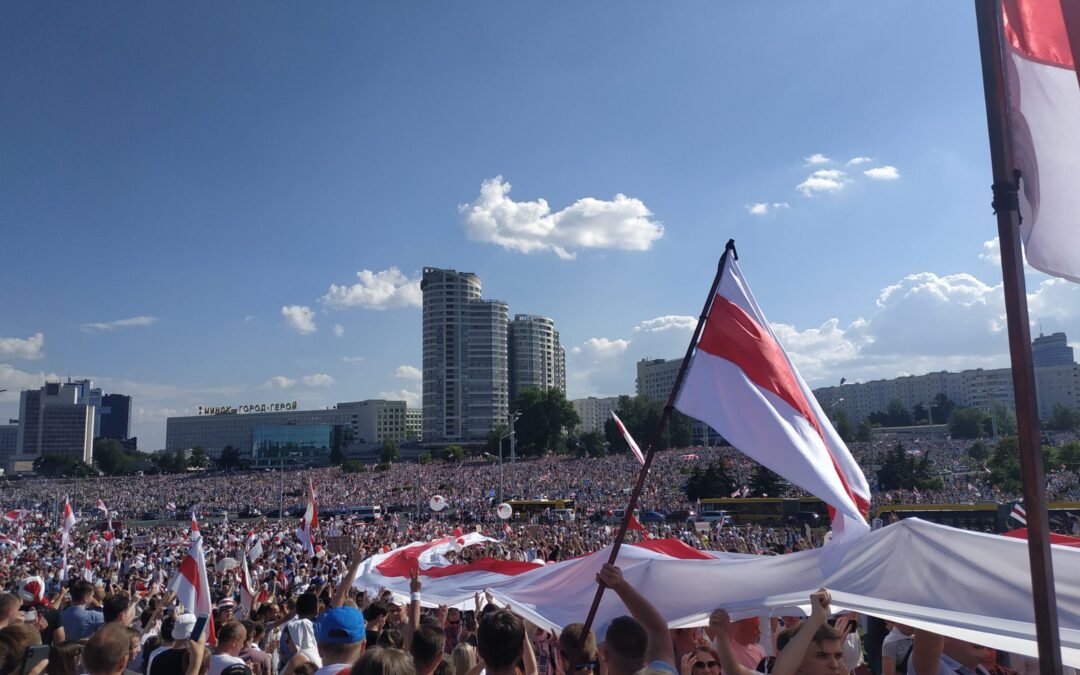
Sep 18, 2020 | Advocacy, Non-legal submissions
At a special session of the UN Human Rights Council in Geneva, the ICJ and IBAHRI have called on Belarus to comply with its international human rights obligations, including by releasing those arbitrarily detained and ceasing abusive prosecutions as well as harassment of lawyers.
The oral statement read as follows:
“Madame President,
The International Commission of Jurists (ICJ) and the International Bar Association’s Human Rights Institute (IBAHRI) are concerned at the continuing human rights violations in Belarus following the Presidential election. Widespread arbitrary arrests, police violence against peaceful protesters, torture and other ill-treatment of detainees and allegations of enforced disappearances, violate Belarus’s international law obligations, and require accountability.
Our organizations are particularly concerned about reports that these violations are accompanied by widespread denial of detainees’ access to a lawyer. Lawyers face harassment and obstacles in carrying out their professional duties.
We highlight the recent arrests and detention of two prominent lawyers, Ilya Salei and Maxim Znak, on politically motivated charges on 9 September 2020. According to official information, the lawyers are charged with the crime of “calls for actions aimed at causing harm to the national security of the Republic of Belarus”.
We urge the Council to call on Belarus to:
- comply with its international human rights obligations, including by releasing those arbitrarily detained and ceasing abusive prosecutions;
- provide detainees with confidential access to lawyers of their choice;
- end harassment of lawyers and ensure accountability and reparations for those whose human rights have been violated; and
- request OHCHR to monitor and report to the Human Rights Council on the human rights situations in Belarus.
Thank you”
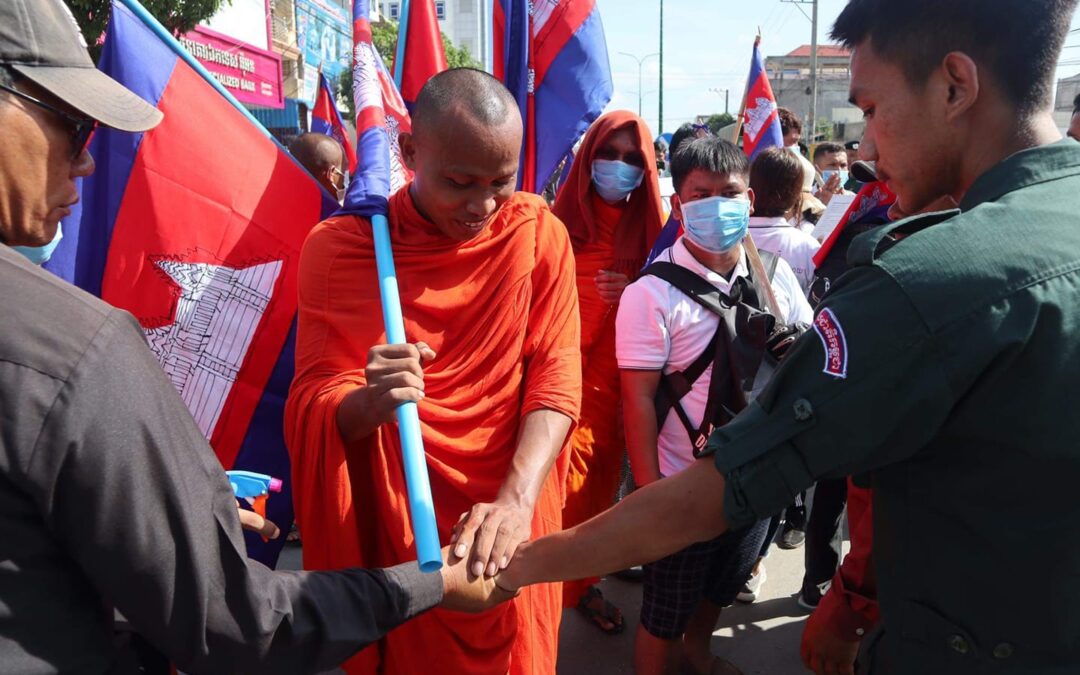
Sep 11, 2020 | News
Today, the ICJ condemned an ongoing and heightened crackdown on civil society activists and human rights defenders in Cambodia, and called on the Royal Government of Cambodia (“RGC”) to cease arbitrary arrest and other harassment of individuals for merely exercising their human rights and fundamental freedoms.
From end-July to early this week, at least eleven activists have been arrested and detained on spurious charges in an invigorated attempt by authorities to silence critical dissent in the country.
“The Cambodian authorities in recent days have ratcheted up their abuse of domestic laws to target human rights defenders and perceived critics of the government. We fear that without a robust international response, the situation will only deteriorate further,” said Kingsley Abbott, ICJ Senior Legal Adviser.
“They are now targeting youth in particular, in an apparent bid to curtail their use of social media to amplify dissatisfaction with the ruling regime. Instead of attacking them, the government needs to stop and listen to their people,” he added.
Several arrests have been linked with the detention of prominent union leader, Rong Chhun. On 31 July, Rong Chhun, President of the Cambodian Confederation of Unions, was arrested at his home in suspected retaliation for comments he had made alleging loss of community land in relation to demarcation of the Cambodian-Vietnamese border. He was thereafter charged with “incitement to commit a felony or disturb social security,” under articles 494 and 495 of the Criminal Code. He is currently in detention in Phnom Penh’s Correctional Centre 1.
On 13 August, Hun Vannak and Chhouen Daravy, founding members of the Khmer Thavrak youth activist group, were arrested in relation to a rally they had held outside Phnom Penh Municipal Court in support of Rong Chhun. Daravy was reportedly slapped, then grabbed and hit before being pushed into a vehicle during her arrest. Security officials also reportedly beat and kicked at people in the rally to disperse the crowd, injuring about ten individuals.
On 6 September, Buddhist monk Venerable Koet Saray and Mean Prommony, Vice-president of the Khmer Student Intelligent League Association, were arrested in apparent connection with a rally they had been organizing to call for Rong Chhun’s release. On 7 September, Khmer Thavrak activists Tha Lavy and Eng Malai were arrested. Tha Lavy was arrested on arriving at a protest at Freedom Park. Eng Malai was arrested the day she had left the UN Office of the High Commissioner for Human Rights’ Cambodia office, where she had raised her security concerns.
Simultaneous arrests of environmental rights activists and a rapper evidence a wider crackdown beyond the case of Rong Chhun. On 4 September, three members of environmental rights group Mother Nature Cambodia, Thun Ratha, Long Kunthea and Phuong Keorasmey were arrested. They were thereafter charged with incitement under articles 494 and 495 of the Criminal Code. On the same day, rapper Kea Sokun was arrested in Siem Reap province and similarly charged with incitement, in apparent connection with a popular song he had released on YouTube, concerning land at the Cambodian-Vietnamese border.
On 7 September, the Ministry of Interior issued a statement denouncing Khmer Thavrak and Mother Nature Cambodia as unauthorized organizations, calling on the responsible authorities to prosecute them.
The ICJ is concerned that the groups are being targeted for allegedly operating without being registered in accordance with the Law on Associations and Non-Governmental Organizations. The requirements under this law are non-compliant with international law and standards that protect human rights and fundamental freedoms, as the ICJ has previously pointed out. The law impermissibly restricts the ability of civil society members to exercise their rights to freedom of association and expression.
The ICJ recalls the responsibility of Cambodia, as expressly stated in the UN Human Rights Defenders Declaration, to “take all necessary measures to ensure the protection by the competent authorities of everyone, individually and in association with others, against any violence, threats, retaliation, de facto or de jure adverse discrimination, pressure or any other arbitrary action as a consequence of his or her legitimate exercise of the rights referred to in the present Declaration.” These rights include, among others, freedoms of expression, opinion, peaceful assembly, association and political participation.
“Far from protecting these rights, the government has been systematically violating them,” said Abbott.
“The recent arrests signal yet another sign of further regression that needs to be called out by the international community, including by partners, missions, UN agencies and financial institutions.”
On 7 September, the UN Special Rapporteur on Cambodia expressed concerns about the recent arrests and also highlighted that she “has been closely following reports that seven different CSOs have been searched or informed of pending visits by the authorities since last week.” Similarly, over the past few days, the UN Special Rapporteur on Human Rights Defenders has expressed concern about the crackdown, stating “peaceful protest is not a crime”.
Contact
Kingsley Abbott, Senior Legal Adviser, ICJ Global Redress & Accountability Initiative e: kingsley.abbott(a)icj.org
See also
ICJ and 31 organizations jointly urge Governments to call for respect of human rights in Cambodia, 22 July 2020
Cambodia: State of Emergency bill violates the rule of law’, 8 April 2020
Misuse of law will do long-term damage to Cambodia, 26 July 2018
‘Cambodia: deteriorating situation for human rights and rule of law (UN statement), 27 June 2018
‘Cambodia: the ICJ condemns Senate’s approval of draft Law on Associations and NGOs, 24 July 2015
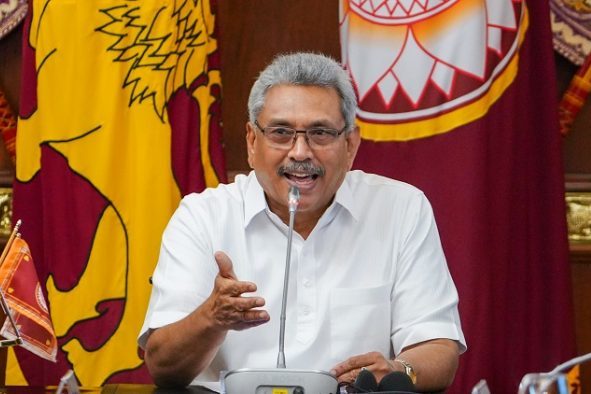
Jul 29, 2020 | Advocacy
The Sri Lankan government should end the targeted arrests, intimidation and threats against the lives and physical security of lawyers, activists, human rights defenders and journalists, the ICJ and 9 other international human rights organizations said today.
A campaign of fear has intensified since the 2019 presidential election, and has cast a shadow over the 2020 parliamentary election campaign.
The United Nations, as well Sri Lanka’s partners and foreign donors, should immediately call for full respect, protection and fulfillment of the human rights of all Sri Lankans, and particularly to halt the reversal of fragile gains in the protection of human rights in recent years.
Numerous civilian institutions, including the NGO Secretariat, have been placed under the control of the Defence Ministry. Serving and retired military officers have been appointed to a slew of senior government roles previously held by civilians.
The authorities have recently established military-led bodies such as the Presidential Task Force to build “a secure country, disciplined, virtuous and lawful society,” which has the power to issue directives to any government official. This represents an alarming trend towards the militarization of the state.
Many of those in government, including the president, defense secretary, and army chief, are accused of war crimes during the internal armed conflict that ended in 2009.
Since the presidential election in November 2019, anti-human rights rhetoric intended to restrict the space for civil society has been amplified by senior members of government.
On 6 July 2020, at an election rally, Prime Minister Mahinda Rajapaksa stated that “NGOs will be taken into a special attention under the new government formed after the General Election, specifically, how foreign monies and grants are received to the NGOs from foreign countries and further, activities of the international organizations will be observed.”
The government has also announced a probe into NGOs registered under the previous government.
In the months following the November 2019 presidential election, a number of organizations reported visits from intelligence officers who sought details of staff, programs and funding, in particular, organizations in the war-affected Northern and Eastern provinces of the country. Such visits are blatant attempts to harass and intimidate Sri Lankan civil society.
In February, the acting District Secretary in the Mullaitivu District (Northern Province) issued a directive that only non-governmental organizations with at least 70 percent of their activities focused on development would be allowed to work, effectively enabling arbitrary interference with and prevention of a broad range of human rights work.
A Jaffna-based think-tank was visited several times, including soon after the Covid-19 lockdown, and questioned about its work, funding and staff details.
Lawyers taking on human rights cases have been targeted through legal and administrative processes and have faced smear campaigns in the media.
Journalists and those voicing critical opinions on social media, have been arbitrarily arrested. The UN High Commissioner for Human Rights expressed alarm at the clampdown on freedom of expression, including the 1 April announcement by the police that any person criticizing officials engaged in the response to Covid-19 would be arrested.
It is unclear whether there is any legal basis for such arrests. The Human Rights Commission of Sri Lanka has cautioned against “an increasing number of such arrests since the issuing of a letter dated 1 April 2020”.
The targeting and repression of journalists and human rights defenders is not only an assault on the rights of these individuals, but an attack on the principles of human rights and the rule of law which should protect all Sri Lankans.
These policies have a chilling effect on the rights to freedom of expression and association, which are crucial for the operation of civil society and fundamental to the advancement of human rights.
Those working on ending impunity and ensuring accountability for past crimes, and especially victims, victim’s families, members of minority communities, and networks in the Northern and Eastern provinces, are particularly at risk of intimidation and harassment.
The Sri Lankan authorities must end all forms of harassment, threats, and abuse of legal processes and police powers against lawyers, human rights defenders and journalists. Human rights defenders living and working in Sri Lanka should be able to carry out their peaceful human rights work without fear of reprisals, which requires a safe and enabling environment in which they can organize, assemble, receive and share information.
Download:
Sri Lanka-Harassment civil society-Advocacy-2020-ENG (the full statement with additional information, in PDF)
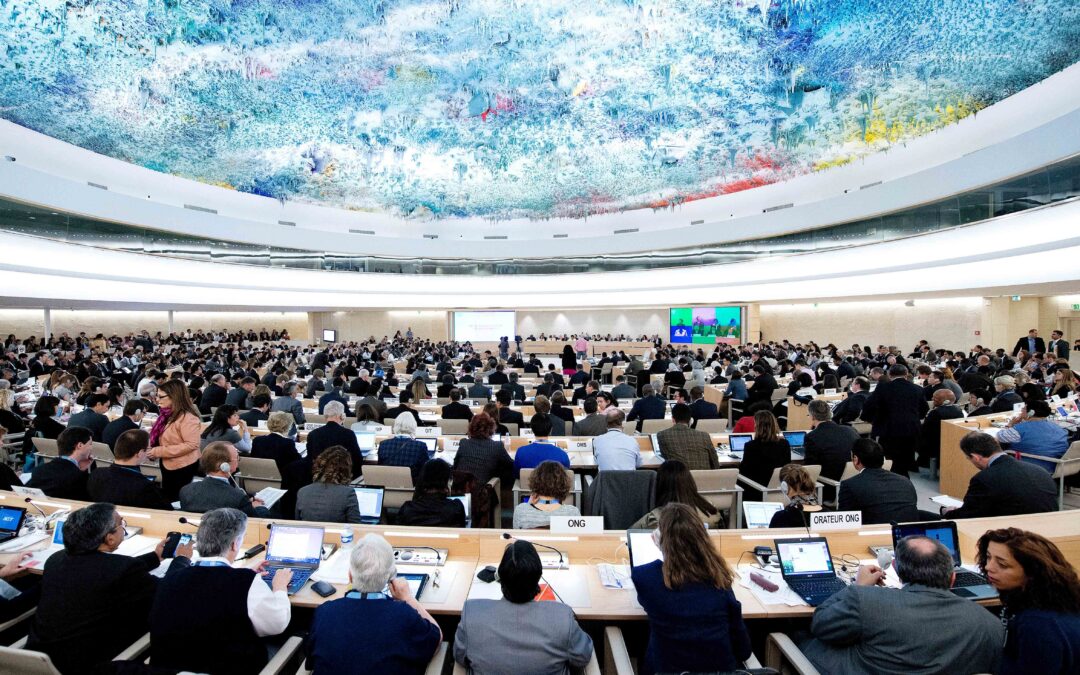
Mar 11, 2020 | Advocacy, Non-legal submissions
ICJ has joined other NGOs in urging India, Pakistan and the Human Rights Council, to take action to address the grave situation for human rights in Jammu & Kashmir.
The joint statement read as follows:
“Our organizations express grave concern over the human rights situation in Jammu & Kashmir, where the authorities imposed severe restrictions after a decision to revoke constitutional autonomy on 5 August 2019, including one of the world’s longest internet shutdowns, which the Indian Supreme Court has said violates the right to freedom of expression.
Hundreds were arbitrarily arrested, and there are some serious allegations of beatings and abusive treatment in custody, including alleged cases of torture. Three former chief ministers, other leading politicians, as well as separatist leaders and their alleged supporters, remain in detention under the Public Safety Act (PSA) and other abusive laws, many without charge and in undisclosed locations outside of Jammu & Kashmir. This violates fair trial safeguards of the criminal justice system and undermines accountability, transparency, and respect for human rights. Journalists and human rights defenders have been threatened for criticizing the clampdown. These violations, as those committed over the past decades, are met with chronic impunity.
We urge the government of India to ensure independent observers including all human rights defenders and foreign journalists are allowed proper access to carry out their work freely and without fear, release everyone detained without charge, and remove restrictions on the rights to freedom of expression and freedom of movement, including where they have been denied the right to leave the country by being placed on the ‘Exit Control List’.
We also call on the governments of India and Pakistan to grant unconditional access to OHCHR and other human rights mechanisms to Kashmir.
We further urge the Council to establish an independent international investigation mechanism into past and ongoing crimes under international law and human rights violations by all parties in Kashmir, as recommended by the UN High Commissioner for Human Rights.
Thank you.
- Amnesty International
- Asian Forum for Human Rights and Development (FORUM-ASIA)
- CIVICUS – World Alliance for Citizen Participation
- Human Rights Watch
- International Commission of Jurists
- International Federation for Human Rights Leagues (FIDH)
- International Service for Human Rights
- World Organisation Against Torture (OMCT)”
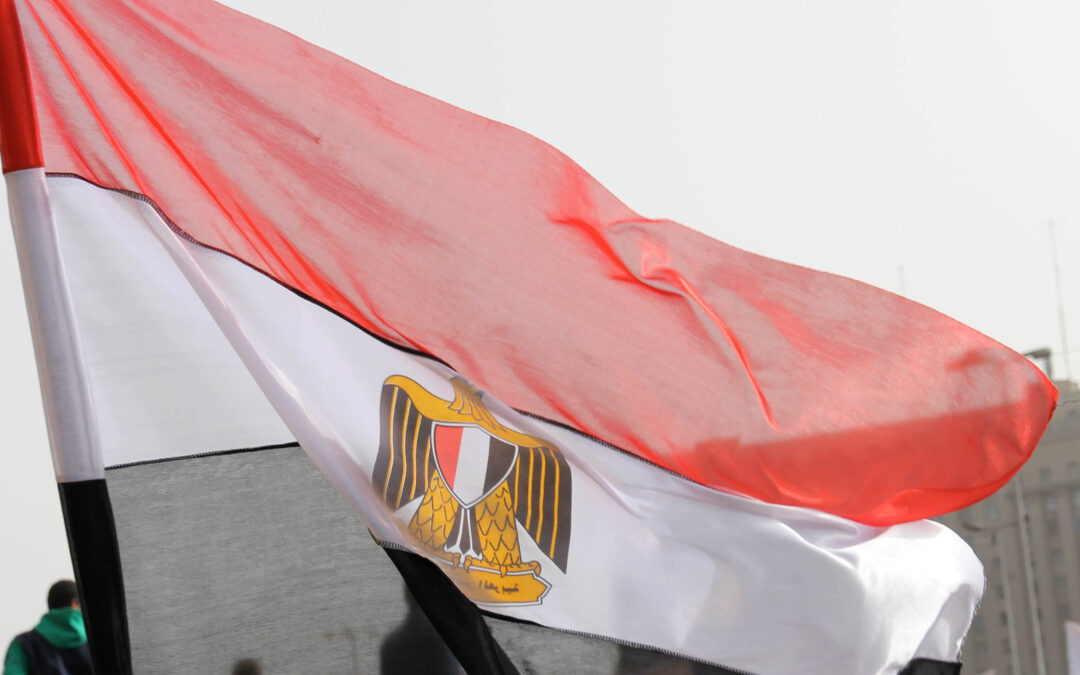
Apr 24, 2019 | News
Egypt is hosting an Africa human rights summit meeting beginning April 24, 2019, while its government is presiding over the worst human rights crisis in the country in recent decades.
The 64th Ordinary Session of the African Commission on Human and Peoples’ Rights (ACHPR), the African Union’s top rights body, will take place from April 24 to May 14 in Sharm al-Sheikh.
In addition to its systematic failure to respect and protect human rights at home, Egypt has also led efforts to undermine the Commission’s independence. The Commission should strongly raise Egypt’s human rights abuses at the meeting.
“Egypt is trying to appear like a country open for human rights delegates and summits while, at the same time, crushing all dissenting voices and its once-vibrant human rights community,” said Michael page, Middle East and North Africa director at Human Rights Watch.
“We know that many Egyptian and international organizations are not allowed to work freely in Egypt and cannot voice concerns without severe retaliation from the government,” he added.
The commission should ensure that all government and non-government delegations are able to participate freely in the summit. It should also make clear that it will strongly address any measures of reprisals by the Egyptian authorities against criticism of its practices.
A senior staff member of a leading Egyptian rights organization told Human Rights Watch that only three Egyptian human rights groups were considering participating in the summit because most of the groups were concerned about retaliation by the government.
In recent years, the Egyptian authorities have relentlessly cracked down on non-governmental organizations, issued the 2017 draconian law that effectively bans all independent work by nongovernmental groups, and prosecuted scores of staff workers of Egyptian organizations.
It has also frozen the assets of the most prominent human rights defenders in the country and their organizations and issued travel bans against scores of them.
In April 2018, the government said it would repeal the abusive 2017 NGO law but the government has not made a new draft law public.
The Egyptian authorities have also taken reprisals against human rights defenders and activists for cooperating with regional and international human rights monitors, including United Nations agencies and experts.
In late 2018, Egyptian authorities detained several citizens who met with the UN special rapporteur on adequate housing during her official mission to Egypt, as well as demolishing their houses and banning their travel. The government denied any wrongdoing and accused the UN High commissioner on human rights and other UN officials of breaching UN standards and adopting the “lies” of “terrorist” organizations.
In September 2017, officials stopped Ibrahim Metwally, a lawyer and co-founder of the Associations of the Families of the Disappeared, from traveling for meetings with UN officials in Geneva. Security agencies arrested him at the airport and held him incommunicado for a few days. He is still held in “pretrial detention” for farcical charges.
The Egyptian government has tried to undermine the independence of the Commission through spearheading the adoption of African Union’s Executive Council’s Decision 1015, paragraph 5. The provision, which was passed in June 2018, undermines the Commission’s independence by subjecting its work to control by the African Union member countries.
The Egyptian government has ignored decisions and resolutions the Commission and its experts have made addressing several violations and abuses including the crackdown on civil society, restrictions on freedom of religion, unfair trials and mass death sentences, arbitrary arrests, and sexual violence.
The ACHPR session comes at a time when the Egyptian authorities have been severely oppressing dissent and obliterating any space for peaceful expression or gathering before the public vote held between April 19-22 on highly draconian constitutional amendments that will strengthen the military control of public and political life and further undermine the already weak judicial independence.
Egyptian human rights organization have documented the arrests of over 160 people, often in mass arrests, since February in relation to the ongoing crackdown on dissidents and perceived critics.
These amendments, and several other laws that President Abdel Fattah al-Sisi has approved in recent years, such as new media laws and laws to expand the use of military courts to try civilians, violate international law standards including the African Charter on Human and Peoples’ Rights.
Since al-Sisi secured a second term in elections that were largely neither free nor fair in March 2018, his security forces have escalated a campaign of intimidation, violence, and arbitrary arrests against political opponents, activists, and many others who have voiced even mild criticism of the government.
The Egyptian government and state media have framed this repression under the guise of combating terrorism, and al-Sisi has increasingly invoked terrorism and the country’s state of emergency law to silence peaceful activists.
In July 2013, the African Union Peace and Security Council suspended Egypt’s membership in all African Union activities following the forcible removal of former President Mohamed Morsy by the army, which was led by al-Sisi, then the defense minister. The suspension ended after al-Sisi was elected President in June 2014.
But Egypt has failed to effectively investigate or to hold any official or member of the security forces accountable for the mass killings of protesters in the summer of 2013 despite several national and international calls, including by the ACHPR, and despite incriminating evidence.
In August 2013, Egyptian security forces most likely killed at least 817 people in a few hours during its violent dispersal of the largely peaceful pro-Morsy sit-in in Cairo’s Raba’ Square. The killings likely amounted to crimes against humanity.
“Through such summits, Egypt is trying to whitewash its dire record of abuses,” George Kegoro, executive director of Kenya Human Rights Commission said. “The African human rights commission should take the opportunity of this meeting to vigorously engage the Egypt government on its own actions that threaten the rights, and the very lives, of many Egyptians.”
The co-signing organizations are:
Andalus Institute for Tolerance and Anti-Violence Studies
Belady Center for Rights and Freedoms
Cairo Institute for Human Rights Studies
Committee for Justice|
EuroMed Rights
Egyptian Front for Human Rights
Human Rights Watch
Kenya Human Rights Commission
The Egyptian Commission for Rights and Freedoms
The Freedom Initiative
The International Commission of Jurists
Egypt-African Rights Summit-News-2019-ARA (Press release, PDF, Arabic)
Contact:
Said Benarbia, Director of ICJ’s MENA Programme, t: +41-79-878-35-46 ; e: said.benarbia(a)icj.org









